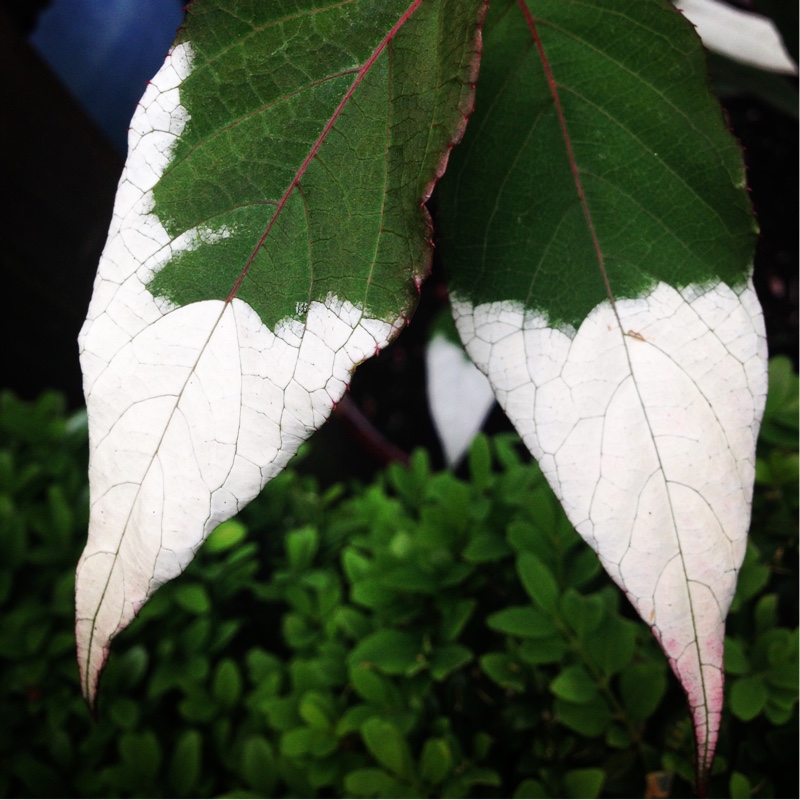
Actinidia tetramera var. maloides syn. Actinidia pilosula
Rosy Crabapple Kiwi
A vigorous, deciduous climber, admired for their foliage and fruit. Ideal for growing up walls and through pergolas. The cup-shaped flowers are white and appear along the branches among the toothed, heart shaped leaves in mid-summer. Fruit form on a female plant, and will need a male plant for fertilising, unless the cultivar grown is self-fertile.To encourage fruiting, pinch young shoots back to about 30cm in summer. After harvesting, allow the fruit to develop for a month before using. Actinidia Pilosula is a straggly decorative climber from the kiwi fruit family with bizarre leaves that look like they have been dipped in paint. As a general rule of thumb the hotter and more sunny the planting position, the better the leaf variegation.
Contributed by @lovell
-
Full sun
-
Occasional watering
-
A little frost hardy: 32F (0°C)
-
Moist and free draining
Common name
Rosy Crabapple Kiwi
Latin name
Actinidia tetramera var. maloides syn. Actinidia pilosula
type
Fruiting Vine
family
Actinidiaceae
ph
5.5 - 7.5 Acid - Neutral
Plant & bloom calendar
-
Best time to plant
-
When the plant will bloom
-
When to harvest
full grown dimensions
 5.00 M
10.00 M
5.00 M
10.00 M
Actinidia tetramera var. maloides syn. Actinidia pilosula
A vigorous, deciduous climber, admired for their foliage and fruit. Ideal for growing up walls and through pergolas. The cup-shaped flowers are white and appear along the branches among the toothed, heart shaped leaves in mid-summer. Fruit form on a female plant, and will need a male plant for fertilising, unless the cultivar grown is self-fertile.To encourage fruiting, pinch young shoots back to about 30cm in summer. After harvesting, allow the fruit to develop for a month before using. Actinidia Pilosula is a straggly decorative climber from the kiwi fruit family with bizarre leaves that look like they have been dipped in paint. As a general rule of thumb the hotter and more sunny the planting position, the better the leaf variegation.
Flowering Season
From Early Summer TO Late Summer
White scented flowers in summer, followed by on female plants only, bristly-skinned, greenish-brown fruit in autumn.
Planting Season
From Early Spring TO Late Spring
In spring plant container grown plants in a well drained, sunny, sheltered, and deeply fertile sire, this needs to be by a south facing wall or strong, tall trellis.
Propagation by seed
From Late Winter TO Early Spring
Sow seed under glass in late winter/early spring.
Propagation by cutting
From Mid Spring TO Early Summer
Stem tip cuttings are taken in the spring/early summer from this years growth. Cleanly cut just below a leaf joint, up to a 10cm tip, remove lower leaves and pinch out the tip, dip into hormone compound and place them around the edge of a pot filled with cutting compost., water well. Place a plastic bag over the pot to give humidity, the bag must be removed a couple of times a week to ventilate, put the pot in a light spot but avoid direct sunlight.
Propagation by cutting
From Late Spring TO Early Autumn
Semi hard wood cuttings are taken from the current years growth from late summer to mid autumn the bottom of the cuttings is hard and soft on the top. With a sharp knife take a cutting of about 14cms, remove lowest leaves, dip end into rooting hormone, and place round the edge of a pot filled with a suitable compost, water well, they must remain moist till rooted, place under glass but in semi shade









